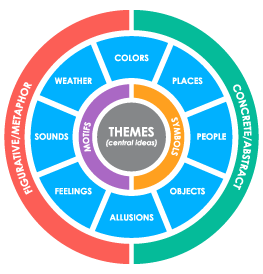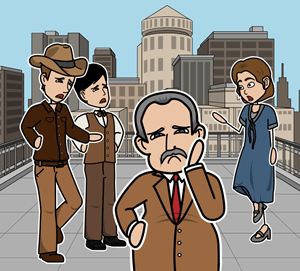Activity Overview
Themes, symbols, and motifs come alive when you use a storyboard. In this activity, students will identify themes and symbols from the play, and support their choices with details from the text. In the classroom, students can track the themes Miller uses in the play to express the tragedy of Willy Lohman.
Themes, Motifs, and Imagery to Look For & Discuss
The American Dream
The American Dream is the idea that no matter a person's background, anyone can achieve their goals through hard work and determination. In Death of a Salesman, Willy Loman's dream is to be a great salesman. He also believed that it was better to be well liked and have charisma than it is to work hard. However, it is his son, Biff, who realized in the end that Willy's dream was wrong and vows to live his life without regret.
Infidelity
Although usually meaning “adultery”, this can also mean a breach of trust and general disloyalty. In the play, Willy feels betrayed by Biff because his son does not fulfill the ambitions that he has for him. However, it is Biff who catches his father with another woman, shifting the onus of betrayal. Willy's infidelity comes full circle when the audience sees him gift a pair of stockings to his mistress while his wife is forced to sew the holes in her stockings.
Exotic Places
To Willy, places like Alaska, the Jungle, and the Wild West represent the untapped potential and ambitions of a better life. His father found success in Alaska, and his brother Ben became rich in Africa, and he had high ambitions for Biff out west. For Willy, these exotic places were an escape from his hackneyed life in New York.
The Home
Throughout the play, many aspects of the home are mentioned. Owning your home and providing for your family are key components of the American Dream. For Willy it is a constant struggle; he can barely afford to keep his appliances. Even when he attempts to commit suicide by inhaling gas, he abandons the attempt after realizing his family needs it to heat the house, again showing his need to provide for the home.
Stockings
In the play, Willy purchases a pair of new stockings for his mistress, while his wife is forced to sew hers because they cannot afford a new pair. This symbol not only serves as a reminder of Willy's infidelity, but also his failure to provide as a good husband and father to his wife and sons.
Template and Class Instructions
(These instructions are completely customizable. After clicking "Copy Activity", update the instructions on the Edit Tab of the assignment.)
Student Instructions
Create a storyboard that identifies recurring themes in Death of a Salesman. Illustrate instances of each theme and write a short description below each cell.
- Click "Start Assignment".
- Identify the theme(s) from Death of a Salesman.
- Create an image for the example(s) that represents this theme.
- Write a description of each of the examples.
Lesson Plan Reference
- CCSS: RL.11-12.1 - Cite strong and thorough textual evidence to support analysis of what the text says explicitly as well as inferences drawn from the text, including determining where the text leaves matters uncertain
- CCSS: RL.11-12.2 - Determine two or more themes or central ideas of a text and analyze their development over the course of the text, including how they interact and build on one another to produce a complex account; provide an objective summary of the text
- CCSS: W.11-12.2 - Write informative/explanatory texts to examine and convey complex ideas, concepts, and information clearly and accurately through the effective selection, organization, and analysis of content
Rubric
(You can also create your own on Quick Rubric.)
| Proficient | Emerging | Beginning | Needs Improvement | |
|---|---|---|---|---|
| Identification of Theme(s), Symbol(s), and/or Motif(s) | All themes are correctly identified as important recurring topics or messages in the story. Symbols are correctly identified as objects that represent something else at a higher level in the story. Motifs are correctly identified as important recurring features or ideas in the story. | Most themes are correctly identified, but others are missing or incomplete. Most symbols are correctly identified, but some objects are missing or incomplete. Some motifs are correctly identified, but others are missing or incomplete. | Most themes are missing, incomplete, or incorrect. Most symbols are missing, incomplete, or incorrect. Most motifs are missing, incomplete, or incorrect. | No themes, symbols, or motifs are correctly identified. |
| Examples and Descriptions | Quotes and examples are accurate to the theme(s), symbol(s), and/or motif(s) that are being identified. Descriptions accurately explain the theme(s), symbol(s), and/or motif(s) and highlight their significance to the story. | Most quotes and examples are accurate to the theme(s), symbol(s), and/or motifs that are being identified. Descriptions mostly accurately explain the theme(s), symbol(s), and/or motif(s), and highlight their significance to the story. | Most quotes and examples are minimal, incorrect, or unrelated to the theme(s), symbol(s), and/or motif(s) that are being identified. Descriptions contain inaccuracies in their explanations, or do not highlight their significance to the story. | Examples and descriptions are missing or too minimal to score. |
| Depiction | Depictions chosen for theme(s), symbol(s), and/or motif(s) are accurate to the story and reflect time, effort, thought, and care with regard to placement and creation of the scenes. | Depictions chosen for theme(s), symbol(s), and/or motif(s) are mostly accurate to the story. They reflect time and effort put into placement and creation of the scenes. | Depictions chosen for theme(s), symbol(s), and/or motif(s) are inaccurate to the story. The depictions may be rushed or show minimal effort, time, and care put into placement and creation of the scenes. | Most depictions are missing too many elements or are too minimal to score. Little time or effort has been put into placement and creation of the scenes. |
| English Conventions | There are no errors in spelling, grammar, or mechanics throughout the storyboard. All writing portions reflect careful proofreading and accuracy to the story. | There are a few errors in spelling, grammar, and mechanics throughout the storyboard. All writing portions show accuracy to the story and some proofreading. | There are several errors in spelling, grammar, and mechanics throughout the storyboard. Most writing portions do not reflect proofreading or accuracy to the story. | Errors in spelling, grammar, and mechanics in writing portions of the storyboard seriously interfere with communication. |
Activity Overview
Themes, symbols, and motifs come alive when you use a storyboard. In this activity, students will identify themes and symbols from the play, and support their choices with details from the text. In the classroom, students can track the themes Miller uses in the play to express the tragedy of Willy Lohman.
Themes, Motifs, and Imagery to Look For & Discuss
The American Dream
The American Dream is the idea that no matter a person's background, anyone can achieve their goals through hard work and determination. In Death of a Salesman, Willy Loman's dream is to be a great salesman. He also believed that it was better to be well liked and have charisma than it is to work hard. However, it is his son, Biff, who realized in the end that Willy's dream was wrong and vows to live his life without regret.
Infidelity
Although usually meaning “adultery”, this can also mean a breach of trust and general disloyalty. In the play, Willy feels betrayed by Biff because his son does not fulfill the ambitions that he has for him. However, it is Biff who catches his father with another woman, shifting the onus of betrayal. Willy's infidelity comes full circle when the audience sees him gift a pair of stockings to his mistress while his wife is forced to sew the holes in her stockings.
Exotic Places
To Willy, places like Alaska, the Jungle, and the Wild West represent the untapped potential and ambitions of a better life. His father found success in Alaska, and his brother Ben became rich in Africa, and he had high ambitions for Biff out west. For Willy, these exotic places were an escape from his hackneyed life in New York.
The Home
Throughout the play, many aspects of the home are mentioned. Owning your home and providing for your family are key components of the American Dream. For Willy it is a constant struggle; he can barely afford to keep his appliances. Even when he attempts to commit suicide by inhaling gas, he abandons the attempt after realizing his family needs it to heat the house, again showing his need to provide for the home.
Stockings
In the play, Willy purchases a pair of new stockings for his mistress, while his wife is forced to sew hers because they cannot afford a new pair. This symbol not only serves as a reminder of Willy's infidelity, but also his failure to provide as a good husband and father to his wife and sons.
Template and Class Instructions
(These instructions are completely customizable. After clicking "Copy Activity", update the instructions on the Edit Tab of the assignment.)
Student Instructions
Create a storyboard that identifies recurring themes in Death of a Salesman. Illustrate instances of each theme and write a short description below each cell.
- Click "Start Assignment".
- Identify the theme(s) from Death of a Salesman.
- Create an image for the example(s) that represents this theme.
- Write a description of each of the examples.
Lesson Plan Reference
- CCSS: RL.11-12.1 - Cite strong and thorough textual evidence to support analysis of what the text says explicitly as well as inferences drawn from the text, including determining where the text leaves matters uncertain
- CCSS: RL.11-12.2 - Determine two or more themes or central ideas of a text and analyze their development over the course of the text, including how they interact and build on one another to produce a complex account; provide an objective summary of the text
- CCSS: W.11-12.2 - Write informative/explanatory texts to examine and convey complex ideas, concepts, and information clearly and accurately through the effective selection, organization, and analysis of content
Rubric
(You can also create your own on Quick Rubric.)
| Proficient | Emerging | Beginning | Needs Improvement | |
|---|---|---|---|---|
| Identification of Theme(s), Symbol(s), and/or Motif(s) | All themes are correctly identified as important recurring topics or messages in the story. Symbols are correctly identified as objects that represent something else at a higher level in the story. Motifs are correctly identified as important recurring features or ideas in the story. | Most themes are correctly identified, but others are missing or incomplete. Most symbols are correctly identified, but some objects are missing or incomplete. Some motifs are correctly identified, but others are missing or incomplete. | Most themes are missing, incomplete, or incorrect. Most symbols are missing, incomplete, or incorrect. Most motifs are missing, incomplete, or incorrect. | No themes, symbols, or motifs are correctly identified. |
| Examples and Descriptions | Quotes and examples are accurate to the theme(s), symbol(s), and/or motif(s) that are being identified. Descriptions accurately explain the theme(s), symbol(s), and/or motif(s) and highlight their significance to the story. | Most quotes and examples are accurate to the theme(s), symbol(s), and/or motifs that are being identified. Descriptions mostly accurately explain the theme(s), symbol(s), and/or motif(s), and highlight their significance to the story. | Most quotes and examples are minimal, incorrect, or unrelated to the theme(s), symbol(s), and/or motif(s) that are being identified. Descriptions contain inaccuracies in their explanations, or do not highlight their significance to the story. | Examples and descriptions are missing or too minimal to score. |
| Depiction | Depictions chosen for theme(s), symbol(s), and/or motif(s) are accurate to the story and reflect time, effort, thought, and care with regard to placement and creation of the scenes. | Depictions chosen for theme(s), symbol(s), and/or motif(s) are mostly accurate to the story. They reflect time and effort put into placement and creation of the scenes. | Depictions chosen for theme(s), symbol(s), and/or motif(s) are inaccurate to the story. The depictions may be rushed or show minimal effort, time, and care put into placement and creation of the scenes. | Most depictions are missing too many elements or are too minimal to score. Little time or effort has been put into placement and creation of the scenes. |
| English Conventions | There are no errors in spelling, grammar, or mechanics throughout the storyboard. All writing portions reflect careful proofreading and accuracy to the story. | There are a few errors in spelling, grammar, and mechanics throughout the storyboard. All writing portions show accuracy to the story and some proofreading. | There are several errors in spelling, grammar, and mechanics throughout the storyboard. Most writing portions do not reflect proofreading or accuracy to the story. | Errors in spelling, grammar, and mechanics in writing portions of the storyboard seriously interfere with communication. |
More Storyboard That Activities
Death of a Salesman
Testimonials
Introductory School Offer
ONLY$500
- 1 School
- 5 Teachers for One Year
- 1 Hour of Virtual PD
30 Day Money Back Guarantee • New Customers Only • Full Price After Introductory Offer • Access is for 1 Calendar Year
© 2025 - Clever Prototypes, LLC - All rights reserved.
StoryboardThat is a trademark of Clever Prototypes, LLC, and Registered in U.S. Patent and Trademark Office












